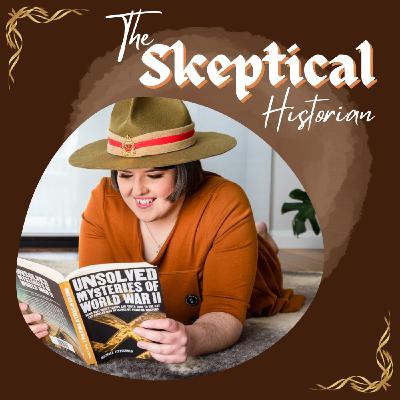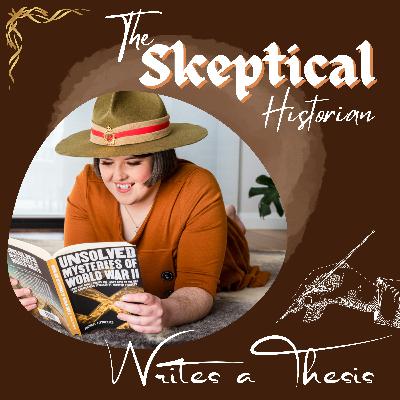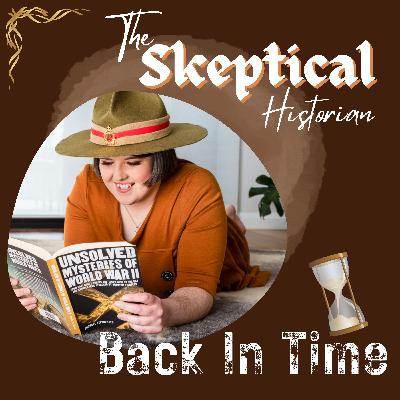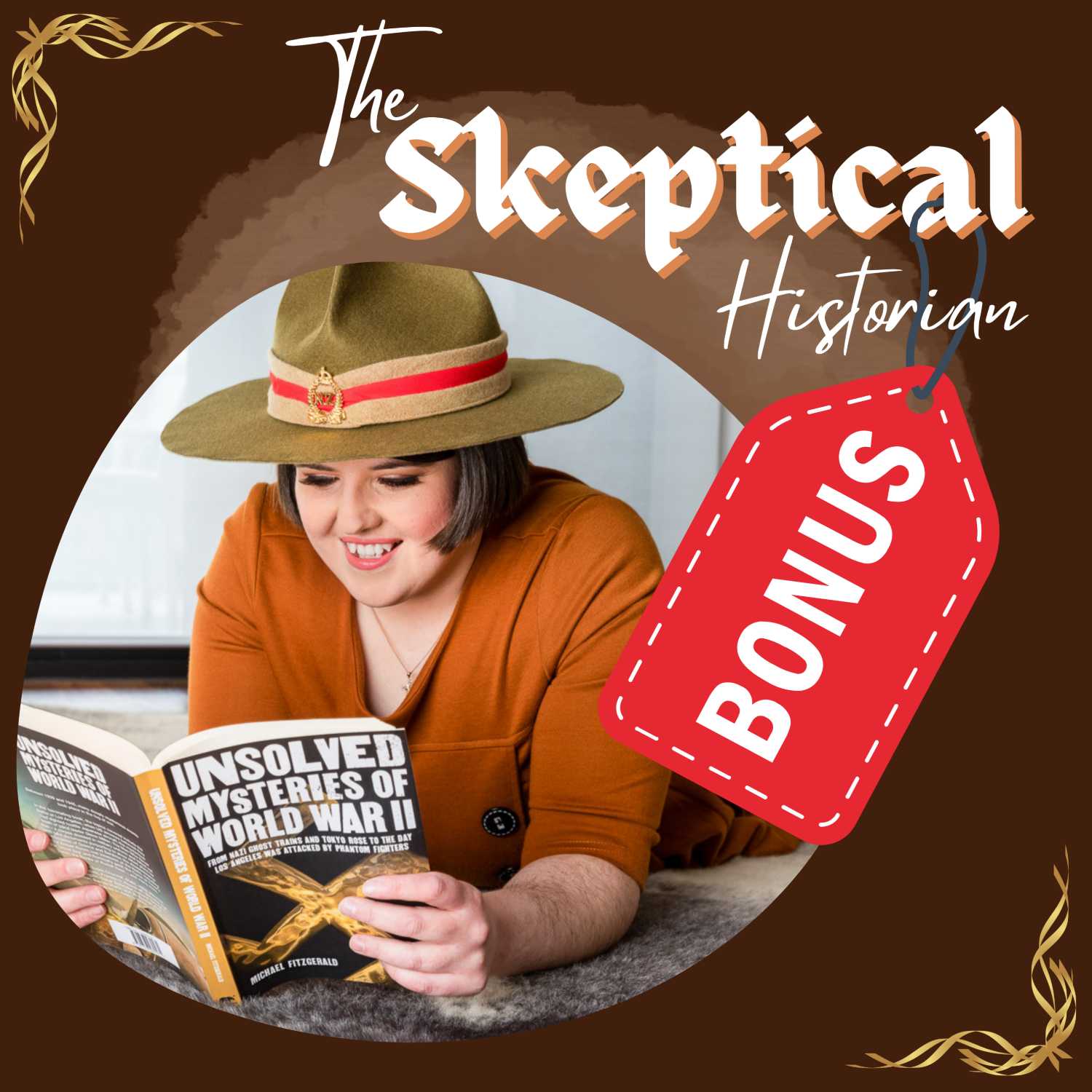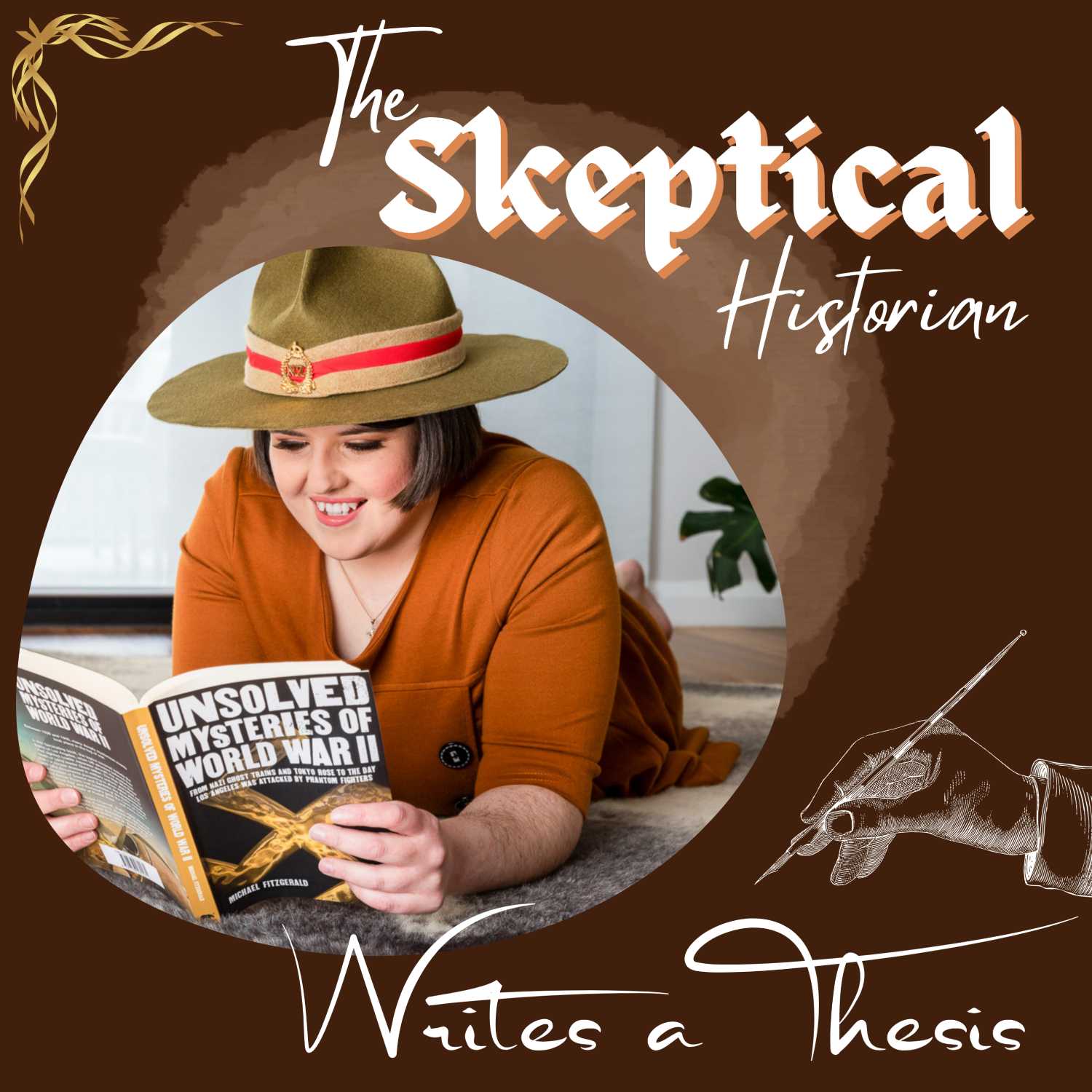Discover The Skeptical Historian
The Skeptical Historian

The Skeptical Historian
Author: Juliana Byers
Subscribed: 4Played: 38Subscribe
Share
© Juliana Byers 2024
Description
Join historian Juliana Byers to take a deep dive into some of the most famous events from Australia and around the world, and answer that all important question: did that REALLY happen?
New episodes released monthly.
42 Episodes
Reverse
At the time of recording, the most watched drama on Netflix in Australia was "Apple Cider Vinegar" which was inspired by the story of fraudster Belle Gibson, who built an empire pretending to have cured herself of cancer. But Gibson was not the first (nor will she be the last) to profit from selling fake cures.In colonial Australia, long before Gibson and "Apple Cider Vinegar," quack medicine was everywhere. In this episode, Juliana examines the allure of deadly soothing syrups for babies, full of opium, alcohol and cannabis, and how a savvy businessman selling vegetable oil as a cure-all used advertising to make himself rich. She also offers a peek behind the curtain at the living conditions which made these medicines so desirable, and how long-overdue regulation finally ended their reign around the beginning of the twentieth century.Listeners please note, the episode contains racist language in historical context.Check out The Commons Gipps Street: https://www.thecommons.com.au/locations/the-commons-collingwood-gipps-street
The horror of the Second Fleet is one of Australia's most shameful untold stories. Just two years after the First Fleet landed with barely any European causalities, six more ships arrived full of dead and dying convicts. But what had gone so wrong?This month, Juliana examines how perverse incentives, greed, poorly written contracts and human frailties all collided to create the catastrophe of the Second Fleet, and what we can learn from it today.
On 22 May 1936, Victoria's most famous detective John O'Connell Brophy, was shot four times in Royal Park, while sitting in an idling car with three civilians. After a bungled cover-up, a Royal Commission was established to sort fact from fiction, but there's still some gaping holes ninety years later.This month, Juliana turns her researcher's eye to this tale, peeling back the layers of cover-up, press speculation and depression-era hysteria to find the answer to the questions which still haunt this case. Buckle up skeptics, this one's a wild ride.
On February 6 1851, the most extensive bushfire in Victoria’s history roared through the unprepared colony.At least twelve people, one million sheep, thousands of cattle and countless native animals died in the blaze, and over a quarter of the colony was burnt.But how did such a devastating fire occur, and why have we never had another one so extensive?Listen in to find out more.
On New Year's Day 1915, Gool Mohamed and "Mullah" Abdullah, two local cameleers from Broken Hill, New South Wales, opened fire on a train full of people setting off to enjoy a picnic in nearby Silverton. The men were shot dead later in the day by police. But what caused them to open fire? Was it Australia's first terrorist attack, as some have claimed? An attack on Australia by the forces of the Ottoman Empire? Or something simpler and (perhaps) more terrifying?Listen in and find out.
Captain Henry Wise, 40th Regiment, is the most famous of the soldiers who stormed the Eureka Stockade in 1854. His death rocked Ballarat to its core and, even today, debate rages about his character, his actions at the stockade, and who it was that fired the fatal shot.Join Juliana in the season finale of "The Skeptical Historian Writes A Thesis" as she examines the short life of this famous officer and what lessons his death has for the ongoing study of Eureka.
In 1885, the British parliament passed laws which made it illegal to rape a minor child, i.e. anyone under the age of sixteen. This came after more than a decade of campaigning by reformers and pushback from politicians. These 1885 laws were the first time the age of consent laws in Britain and the empire had been updated since the 1500s!But were these laws as benign on the surface as they appeared, or was there something darker about the long-standing campaign to raise the age of consent? It may come as a shock today, but few reformers actually cared about child sex abuse, and wanted these laws on the books for another reason entirely. Listen in to find out more.WARNING: This episode contains discussion of material which some listeners may find distressing or offensive.
We're talked about Melbourne after the gold rush... but what happened before the shiny metal was found, and what were the dreams of the early Europeans when they arrived on the Yarra River? In this special short episode, Juliana considers the two warring Johns who famously claimed to have founded Melbourne: John Batman and John Pascoe Fawkner. Warning: This podcast contains mentions of colonial era atrocities against Indigenous people.
On the 8th of December 1941, Australia declared war on Japan. Just over two months later, Japanese planes appeared over Darwin and rained hell on our northernmost city.But was it a prelude to an invasion, or something else?Inspired by a recent conference paper, Juliana takes a break from Eureka to explore the popular belief that Australia narrowly escaped a Japanese invasion in 1941 and '42, and considers why this idea has become so embedded in the Australian psyche. After all, the Japanese weren't really coming... were they?
Back in Time: After twelve months of campaigning, the Adelaide city council recently announced that they WILL NOT be adding the name of infamous war criminal Harry Morant to the Boer War memorial in Adelaide. This is a good decision, but who was Morant and why was he such a controversial figure? Find out in this classic episode of the Skeptical Historian.In February 1902, Harry "The Breaker" Morant was executed by firing squad in South Africa, after being found guilty of the murder of twelve Boers, nine of them prisoners of war. That should have been the end of him, but 120 years later we're still debating whether this man was a war criminal, or a true-blue Aussie hero. Juliana takes a hard look at the truth behind The Breaker, revealing disturbing facts about his character and the nature of his crimes. Was this man truly an innocent Australian, or something much darker? Listen in and find out.
Out on the road near Ballarat, a party of 200 armed Americans lay in wait for a column of British infantry making haste to the restless goldfield. What would have happened if they'd crossed paths? The American contribution to Eureka has been buried, forgotten and (in some cases) deliberately written out of this famous story. In this episode, Juliana considers why the Americans have been forgotten, and shines a light on their participation in the stockade, and the famous events surrounding it. The Americans made up the largest ethnic group within the stockade, and accounted for most of the causalities, but why did so many of them want to involve themselves in British politics? Listen in and find out!WARNING: This episode contains mentions of slavery and animal cruelty. Listener discretion is advised.
Juliana's away this fortnight, but listen in as she goes back in time and revisits an early episode from Season 1 of "The Skeptical Historian." 'Five Final Minutes' examines the mysterious crash of Trans Australian Airlines Flight 538, and the surprising safety legacy that followed.***On the 10th of June 1960, Trans Australia Airlines Flight 538 was attempting to land at MacKay airport in Queensland, Australia. Within the space of five minutes, the plane had lost radio contact and disappeared.Five hours later, the wreckage was found floating off the Queensland coast and the story of T.A.A Flight 538's final five minutes have continued to haunt investigators to this day. What happened? And how did it happen so fast? Join Juliana as she attempts to answer these questions and examines how attitudes towards air safety changed in the wake of Flight 538, including the contribution one Australian made to keeping the skies safer.
In the 170 years or so since Eureka, there have been two perspectives which have commanded attention: those of the stockaders, and that of the Victorian Government. The military, who played a major role in the event, have been side-lined from the historical re-telling. In this episode, Juliana explores the report written by Captain John Thomas, the commanding officer at Eureka, to see what it can tell us about why the military acted as they did at Eureka, and the importance of understanding a story from a range of perspectives.
In April 1855, while in hiding from the law after the Battle of the Eureka Stockade, Peter Lalor, the rebel Commander-in-Chief, wrote an open letter that has since become the Holy Gospel of Eureka. It is one of the most quoted and referenced documents regarding this event, and is indispensable to any serious study of the Eureka Stockade, or the Ballarat goldfields. But is it all we've been led to believe? Peter Lalor was a smooth political operator with grand ambitions. He wasn't going to let something as big as Eureka pass without using it to his advantage!In this two-part episode, Juliana unpicks Lalor's famous open letter "To The Colonists" and sorts through the myths to get at the facts. Part II considers the command structure inside the stockade, the attack itself, Peter Lalor's life-changing injury and the treatment of civilians by the military and police. Tune in after the credits to hear the second part of Lalor's letter, read by Juliana.
In April 1855, while in hiding from the law after the Battle of the Eureka Stockade, Peter Lalor, the rebel Commander-in-Chief, wrote an open letter that has since become the Holy Gospel of Eureka. It is one of the most quoted and referenced documents regarding this event, and is indispensable to any serious study of the Eureka Stockade, or the Ballarat goldfields. But is it all we've been led to believe? Peter Lalor was a smooth political operator with grand ambitions. He wasn't going to let something as big as Eureka pass without using it to his advantage!In this two-part episode, Juliana unpicks Lalor's famous open letter "To The Colonists" and sorts through the myths to get at the facts. Part I examines the build up to the stockade, and the events such as the Ambush of the 12th Regiment, the Gravel Pits Riot, the oath beneath the Southern Cross, and the attacks on civilians by roving bands of stockaders. Tune in after the credits to hear the first part of Lalor's letter, read by Juliana, and listen in next episode to hear the dramatic conclusion.
On the 17th of October 1854, just six weeks before the famous Battle of the Eureka Stockade, a mob of furious diggers surrounded the opulent Eureka Hotel in Ballarat and burned it to the ground. The publican had recently got away with murder and the burning of the Eureka has been presented ever since as either a triumph of justice for the people, or the symptom of men pushed too far, too hard, who finally snapped.But was it quite as spontaneous as the arsonists would like us to believe? This fortnight, Juliana considers the circumstances around this infamous act of violence and unpicks the mythology to reveal a far darker tale than a riot which got out of hand. What were the consequences when the Eureka was burned down? Was there any justification at all? And did it have any connection to the Eureka Stockade? Listen in, and find out.
Just one year after trying to keep activist Egon Kisch out, the Australian government set their sights on excluding Mabel Freer, a British Indian woman who was coming to Australia to get married. She was white, she was a minor aristocrat, she was the very person Australia was trying to encourage to immigrate under the white Australia policy. So why were they excluding her?As it turned out, it had nothing to do with Mabel's ethnicity and was a stinking cauldron of sexism, classism and nasty-old colonial racism. The Australian Government, the Australian Army, and two private families all worked together to pressure the government to keep Freer out. Unfortunately for the government, they severely underestimated just how much the voting public hated the idea that their elected representatives were acting in a private matter. The result? Listen in and find out.
In 1934, Czechoslovakian activist Egon Kisch, an anti-war, anti-fascist campaigner who had escaped the horrors of Nazi Germany was invited to speak at an anti-fascist rally in Australia. He was stopped at the border by Australian immigration officials and prohibited from entering the country.Kisch was not the kind of man to go down without a fight, however, and through a series of legal maneuvers he was finally able to speak and lecture to adoring crowds. The government's attempts to keep him out had turned him from a relatively unknown overseas activist into a national celebrity. But what did Australia's infamous "White Australia Policy" have to do with Kisch and how on earth does Scottish Gaelic fit into this story?
Australia Day. Invasion Day. An arbitrary date in January everyone likes to argue about. Whatever the 26th of January is for you, there's no other day in the Australian calendar that sparks so much passionate debate and fierce hatred, but what what is it about this day that gets people so hot under the collar?In this special bonus episode, we'll unpack some of the myths abut Australia Day and fact check a post that's been doing the rounds on social media about the Citizenship Act and its link to January 26. Regular programming will continue as usual following this episode.
In 1851, the colony of Victoria was hovering on the verge of complete collapse as gold fever swept the inhabitants. Unable to cope, facing record high levels of inflation and with a famine threatening the colony, Governor La Trobe wrote in desperation to London to ask for a military force to restore order. They responded by sending one of the most famous regiments of their day: the 40th Regiment of Foot. But why? The 40th were far away, it took almost twelve months from when La Trobe sent his letter for them to arrive in Victoria. What was it about this famous regiment that made them seem like the perfect men to knock a restless colony back into shape? Listen in and find out.


